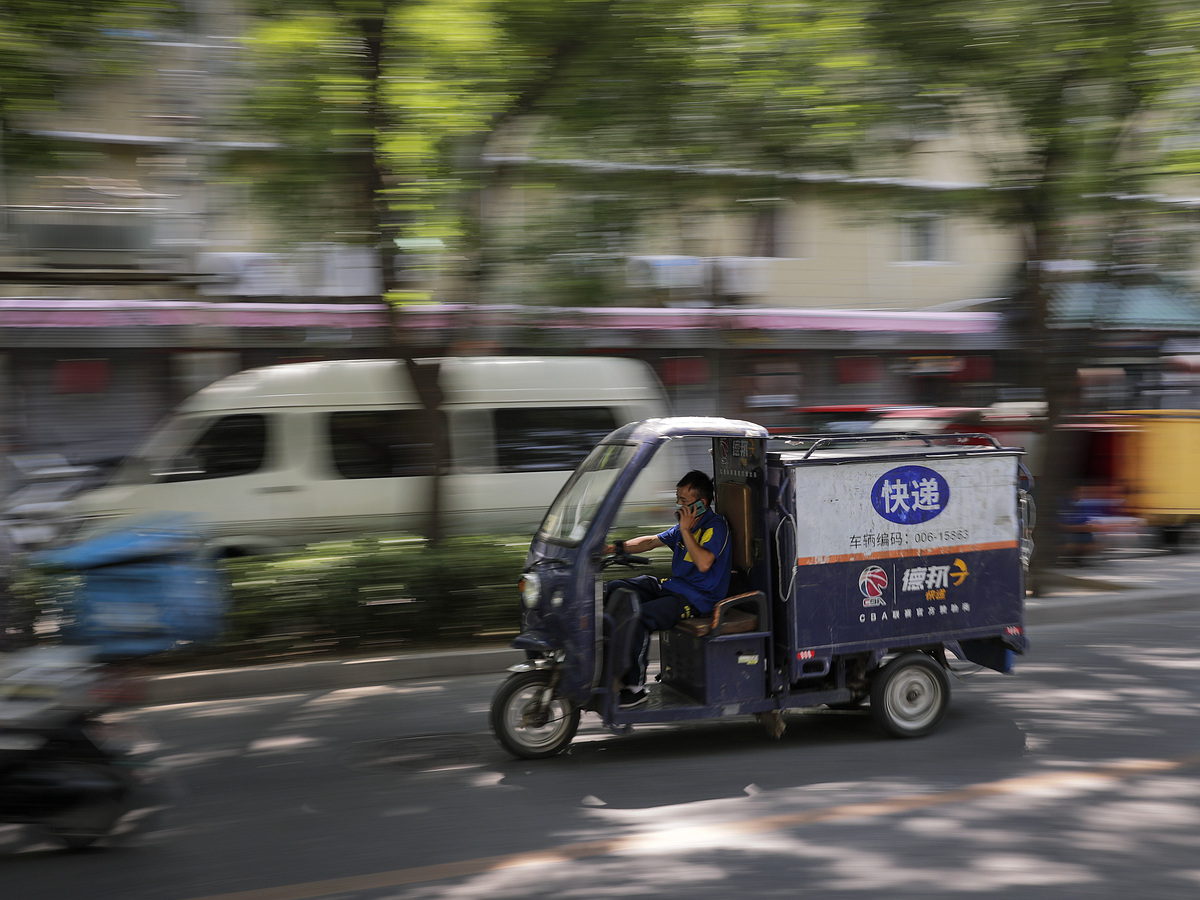For China’s Overburdened Delivery Workers, The Customer — And App — Is Always Right :

A private delivery company’s courier drives his delivery vehicle in a residential area in Beijing in June.
Andy Wong/AP
hide caption
toggle caption
Andy Wong/AP

A private delivery company’s courier drives his delivery vehicle in a residential area in Beijing in June.
Andy Wong/AP
Zhang was the picture of despair the first time I met him.
He had accidentally delivered a package to a neighbor of mine who took it and would not give it back. Now, trembling, he wanted to personally reimburse me for the lost item.
I refused to take his money, but for two days, he called me nonstop to apologize. At the time, I did not understand why he was so repentant. Then I found out how closely monitored — and severely punished — delivery workers like him are.
“Customers complain, and after multiple complaints, we get fined very heavily,” says Zhang. NPR spoke with nearly a dozen delivery workers in Beijing for this story and agreed to use only surnames, because the workers could be punished for talking to a reporter.
The delivery workers described grueling routines: 12-hour days, six days a week, under the automated and watchful eye of mobile apps that track how and when they deliver hundreds of packages a day.
Delivery workers are a critical link in China’s on-demand courier services, which ship more than 60 billion packages a year and generate nearly 1% of the country’s annual economic activity.
Yet even as booming e-commerce platforms result in higher numbers of packages delivered each day, courier services are cutting the fees they pay delivery workers per package delivered. Five Chinese delivery workers told NPR their per-package fees had dropped by an average of 25% in the past year.
“Rewards are light” and punishments “heavy”
China’s more than 3 million delivery workers are a ubiquitous sight on city streets, zipping around haphazardly on scooters and auto rickshaws. They ensure that a food takeout order can arrive in minutes; an online purchase, the same day.
But there is a dark side to this ultraconvenient service.
Their performance is evaluated by mobile apps on phones that the courier services give workers — these delivery logistics apps track their deliveries, sometimes deducting hundreds of dollars in penalties from monthly compensation that averages below $800.
“The rewards are light, but the punishments are always heavy,” says a delivery worker named Wang who works for Zhongtong, one of China’s largest courier services.
Good customer reviews earn delivery workers virtual points in the app, which serve as a buffer against deductions. In the case of a late package or a three-out-of-five-star review, the app will knock off points. Too few points, and a worker gets fined.
If Wang fails to garner at least one five-star review a month, he gets slapped with an $8 pay deduction. If someone complains by email, Wang is fined about $300, nearly a week’s wages. Lesser offenses can carry fines of about $30 to $80.
“On those days, it is as if I worked the entire day, delivering 400 packages, for nothing,” he says.
In China, customers are provided the delivery worker’s mobile number for each package they order, giving the recipient a direct and highly personal link to monitor — or heckle — delivery workers.
“Many clients really like to make life difficult. They will call just to make you walk up 11 flights of stairs or to criticize you for not delivering their package to their door that very day,” says Zhang, the delivery worker in my compound.
Yet he remains unfailingly polite on such calls. Display even a trace of anger to a customer and “they threaten to report you,” says Zhang. He faces a $300 fine for such complaints.
Disputing those fines is nearly impossible — that’s why Zhang was so scared when he lost my package, fearing I would report him.
“Always our mistake”
Zhang allowed me to tag along on a delivery run in November. He drives a three-wheeled cart of sorts more than an hour into central Beijing to deliver to my compound.
His route that day was relaxed — only about 60 packages to deliver. On most days he has about 200. I still struggled to keep up with the 21-year-old’s hurried stride.
Zhang works for a smaller courier service that contracts with China’s five biggest delivery platforms – each multibillion-dollar listed companies whose founders are among China’s richest men. By contrast, delivery workers like Zhang earn only 15 to 30 cents per package.
Yet they are the crucial, last-mile step and the only customer-facing link in the logistics supply chain, meaning they are…
Read More:For China’s Overburdened Delivery Workers, The Customer — And App — Is Always Right :
